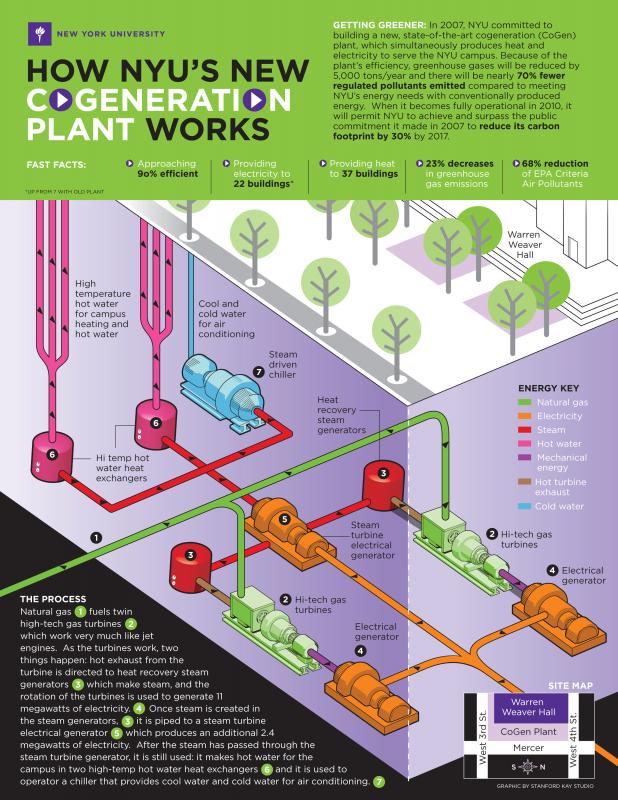Rockland’s energy conversation continues: Aug. 19 forum on gas-fired heat and power plants
ROCKLAND — On Wednesday evening, Aug. 19, at City Hall, Rockland’s Energy Committee and the City’s Department of Community and Economic Development are cosponsoring a public forum to explore community energy questions. The forum, which begins at 6:30 p.m., is a continuation of talks begun last winter when a proposal appeared before the city to site a natural gas-fired energy production facility on city-owned property.
“In an era when the goal is to reduce carbon emissions released into the air, how does a community weigh the merits of a new natural gas-fired combined heat and power plant?” the city asks, in a news release announcing the forum. “In a community like Rockland where specialty manufacturing is key to the strength of the year-round economy, how critical is natural gas to the viability and competitive position of these businesses for the next 30 to 50 years?”
The city circulated its release Aug. 11, and in it, wrote: “Last March, Energy Management, Inc approached Rockland to explore the concept of constructing a combined heat and power (CHP) plant in Rockland. CHP facilities can be low emissions sources of cost effective energy because most of the exhaust heat from burning fuel to produce electricity is then recovered as hot water or steam which can be distributed to local businesses for heating, cooling or manufacturing purposes.”
The city cited New York University in Manhattan and Longwood Medical Area, in Boston, as well as European cities, as using CHP facilities to supply power to local district energy system.
Such a system, also known as cogeneration, disseminates heat, electricity and chilled water produced at the CHP facility to businesses and homes.
The press release, written by the city’s Energy Committee chairman Larry Pritchett and Rockland’s Community Development Director Audra Caller-Bell, said CHPs work “to meet low climate change emissions goals and to provide more resilient sources of locally generated power.
“For example, during Hurricane Sandy the CHP/District Energy system at New York University kept the lights on and virtually all aspects of the University functional when all of lower Manhattan around the University’s campus was dark for days. NYU’s then new natural gas fired CHP facility had been built to meet the University’s 2030 Carbon Emissions reduction goals.”
They said, however, that: “in an era of climate change and rising sea level new facilities that utilize fossil fuels, even lower emissions fuels like natural gas, raise serious questions. Would a local CHP facility replace enough existing sources of air emissions in Rockland so that the amount of pollutants, including carbon dioxide, discharged locally decline? Would the energy produced be readily available, reliable and cost effective for local businesses?”
In late May, the City’s Energy Committee facilitated a public forum in which Evan Coleman from EMI presented an overview of a possible combined heat and power plant in Rockland and at which the Community asked a range of energy and environmental questions.
In response to the questions raised at the May forum, the Energy Committee and City staff is organizing a follow up forum Aug. 19 with several individuals with decades of related experience The City’s goal with the Aug. 19 event is to provide the community with an opportunity to explore the energy, environmental and regulatory context in which a CHP plant and a district energy system is being proposed. The following people will be presenting and answering questions.
Tim Schneider is Maine’s Public Advocate. It is the responsibility of Schneider and his staff to represent consumers’ interest in utility cases before Maine’s Public Utilities Commission. Tim will speak to questions about how his office reviews the ratepayer implications of a project that goes before the PUC and how the PUC has traditionally determined whether a contract with a facility to supply power can produce electricity at a rate that is in consumer’s best interest.
Schneider will speak to how natural gas influences electricity prices in Maine and under what scenarios as well as in what areas of the state due to grid constraints addition local generation might be warranted.
Greg Cunningham is the director of the Conservation Law Foundation’s Clean Energy and Climate Change program. He is based in Maine, but CLF works throughout New England. CLF has a long history of advocating for cleaner energy sources that eliminate mercury air emissions that contaminate Maine’s lakes, that reduce pollutants that contribute to acid rain along the coast; and that reduce air emissions that contribute to asthma and other health problems.
He will talk about the environmental permitting process for a combined heat and power plant and how any potential air emissions would be reviewed. Also, in its efforts to reduce air pollution and address climate change, CLF has in some cases supported natural gas projects and in other cases opposed natural gas projects. CLF will explain how, as an environmental organization, they weigh the merits and limitations of natural gas.
Tony Buxton is the chairman of Preti Flaherty’s Energy and Utilities practice. He has been involved with a range of energy projects including renewable energy projects and grid expansion alternative projects.
Both Schneider and Buxton will explain the role natural gas currently plays, and could play, in providing energy for electricity, for heat, and for manufacturing in Maine.
“Energy is an important, complex and challenging community question,” the city said, in its release. “The Energy Committee, City Staff and members of Council invite all residents to participate in the Aug. 19 forum.”
Reach Editorial Director Lynda Clancy at lyndaclancy@penbaypilot.com; 207-706-6657
Event Date
Address
United States
























